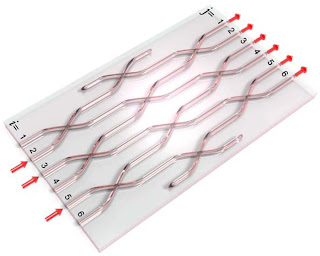 |
Ins and outs. In all four experiments, three photons run through an optical maze like this one. Credit: J. B. Spring et al., Science (2012) |
As in photonic boson sampling...
You've heard the hype a hundred times: Physicists hope to someday build a whiz-bang quantum computer that can solve problems that would overwhelm an ordinary computer. Now, four separate teams have taken a step toward achieving such "quantum speed-up" by demonstrating a simpler, more limited form of quantum computing that, if it can be improved, might soon give classical computers a run for their money. But don't get your hopes up for a full-fledged quantum computer. The gizmos may not be good for much beyond one particular calculation.
Even with the caveats, the challenge of quantum computing has proven so difficult that the new papers are gaining notice. "The question is, does this give you a first step to doing a hard calculation quantum mechanically, and it looks like it might," says Scott Aaronson, a theoretical computer scientist at the Massachusetts Institute of Technology (MIT) in Cambridge and an author on one of the papers.
Instead of flipping ordinary bits that can be set to either 0 or 1, a so-called universal quantum computer would manipulate quantum bits, or "qubits," that can be 0, 1, or, thanks to the weirdness of quantum mechanics, 0 and 1 at the same time. Crudely speaking, the quantum computer could crunch many numbers at once instead of doing them one at a time, as a "classical" computer must. So it could solve problems that would overwhelm a regular computer. For example, a full-fledged "universal" quantum computer could quickly factor huge numbers, an ability that could be used to break today's internet encryptions schemes.
Science: New Form of Quantum Computation Promises Showdown With Ordinary Computers
Comments